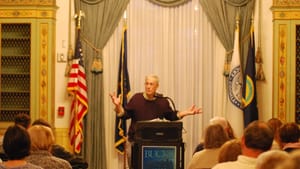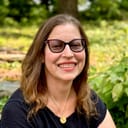Stay in the Loop
BSR publishes on a weekly schedule, with an email newsletter every Wednesday and Thursday morning. There’s no paywall, and subscribing is always free.
A unique legacy of learning
Remembering Bucks County poet, teacher, and activist Christopher Bursk

“...It’s amazing that old philanthropist the sun
hasn’t grown fed up with a species hardly able to appreciate its generosity.
Look at how the earth works
overtime not to swerve from its orbit.
And here I am worrying about the pros and cons of early retirement,
about everyone I’ll let down and
all that will be left undone if I’m not there to do it.
How like us humans to pretend that we’re indispensable.
To what? The light? The air?”
-Excerpted from The Pros And Cons Of The Pathetic Fallacy by Christopher Bursk, published in The Sun magazine (February 2008)
In his poetry, the late, nationally acclaimed Bucks County poet, professor, and activist Christopher Bursk (April 23, 1943 - June 21, 2021) wrote about mortality, family, and how we humans tread on the earth and what legacy we will leave behind when it’s our time to exit this world. In the months since his death at age 78 last June, friends, colleagues, and former students are honoring Bursk’s unique legacy. He will be remembered not only for his published work, but also for his roles as a mentor to generations of aspiring poets both at Bucks County Community College and at the Bucks County Prison.
A 50-year career
Born in Cambridge, Massachusetts, Bursk received his BA from Tufts, an MA and PhD from Boston University, and an MFA from Warren Wilson University. He taught at Bucks County Community College (BCCC) for the last 50 years, was widely published in literary magazines, and published a prolific 17 volumes of poetry. His last work, With Aeneas In a Time of Plague (Ragged Sky Press) was published posthumously in July. Several memorial events have been organized around the book’s publication, including an upcoming reading on November 10, 2021, at the Newtown Bookshop.
Bursk received numerous honors and recognition for his work through the years, including NEA, Guggenheim, and Pew Fellowships. In 1978, he was the Bucks County Poet Laureate and also received numerous prestigious awards for his poetry through the years, including the AWP Donald Hall Poetry Prize, the Allen Ginsberg Prize, and the New Letters Prize in Poetry.
While serving as Bucks County Poet Laureate in 1978, Bursk taught his first poetry class at the Bucks County Prison. That experience became a 30-year volunteer commitment and was a call to activism expressed both in his dedication to teaching there and in his literary work. His 1997 book Cell Count (Texas Tech University Press) was inspired by his experiences with the inmates whom he worked with.
A nurturing style
“Chris would meet you wherever you were,” remembers former student Lorraine Henrie Lins. “He nurtured so many poets who had never written anything before and who went on from his workshops to publish in literary magazines and chapbooks.” Lins recounts her own experience taking a creative writing class at a night school at Neshaminy High School. When she discovered that her preferred writing genre was poetry, the teacher of her class connected her to Bursk.

“I explained to him that I couldn’t afford to take his class at that time and he invited me to audit it. He kept on inviting me,” she says. Lins recalls Bursk’s unique way of giving feedback in the workshops and classes that she took from him. “He would always start by saying ‘Here’s what I’m drawn to’ or ‘Here’s where the magic is,’” she explains. “Then he would say, ‘I wonder if you'd be open to feedback on’ regarding whatever his concerns were.” This nurturing style worked well for Lins, who has since gone on to publish her own work in literary journals and in several published volumes of her poetry. She also serves as the director of new and emerging poets with Tekpoet. She credits Bursk’s generosity of spirit, the time that he gave her, and his incredible kindness, in addition to his excellent teaching of the craft, with helping her to become a poet.
Teacher, activist, lifelong student
John Strauss, professor of language and literature at BCCC and president of its faculty union, was Bursk’s colleague for 34 years. He remembers Bursk not only as a beloved, creative, engaging teacher—but also as a “gutsy human-rights activist” on campus, founding a human rights club for BCCC students.
“Chris created a forum to bring experts to the college to discuss human rights issues and professors would bring their entire classes to those forums,” Strauss says. He recalls how Bursk engaged the student body not only in listening and learning but also in taking action themselves. For example, he remembers how in the late 1980s, when people were becoming aware of homelessness as a human-rights issue, Bursk organized students in sleeping outside on campus, drawing major media attention to the issue.
His actions were sometimes controversial. In 1991, during the First Gulf War, Bursk led a “flag burning” to facilitate questions about the war in a public way with the student body. He created a flag made of paper with words like ‘racism’ and ‘war’ on it and burned it in a public ceremony. For that action, he received death threats.
Strauss emphasizes that Bursk’s actions were always done on behalf of others—his family, the student body, the greater community.
Most recently, Bursk wanted to understand the experience of going through the associate’s degree program at Bucks County Community College so that he could better understand the program’s demands on his students—so he enrolled in it. Bursk attended classes with his own students, taught by his colleagues, and received his degree alongside his students last spring, shortly before his death.
Sign up for our newsletter
All of the week's new articles, all in one place. Sign up for the free weekly BSR newsletters, and don't miss a conversation.

 Gabrielle Kaplan-Mayer
Gabrielle Kaplan-Mayer